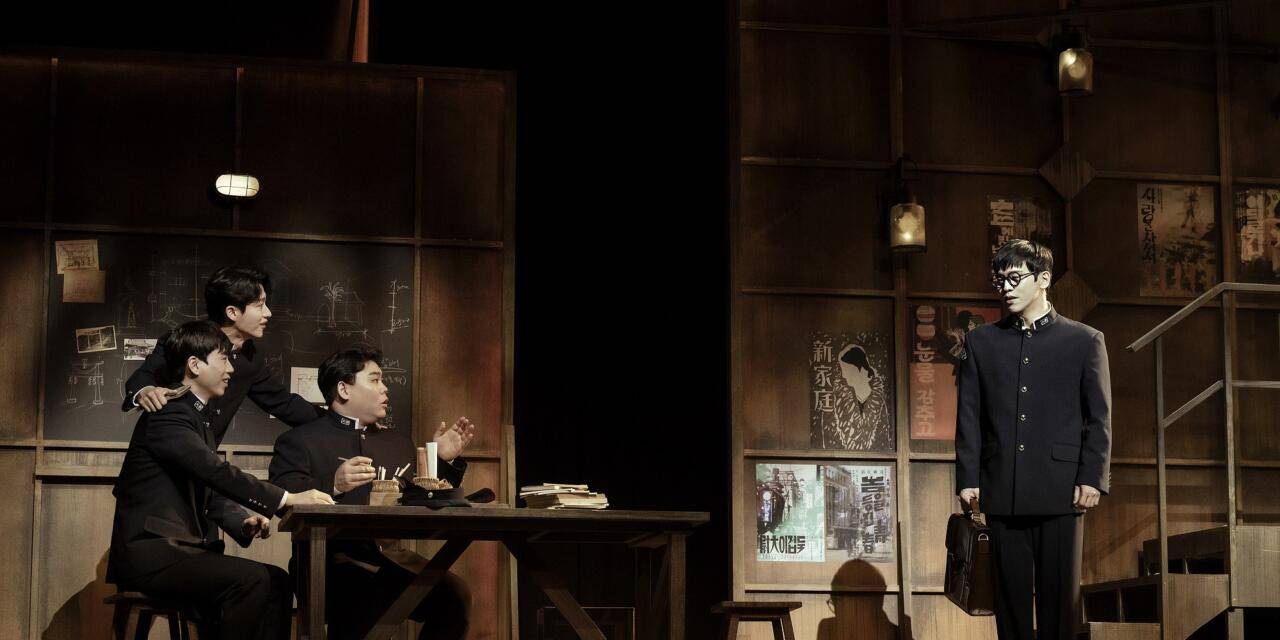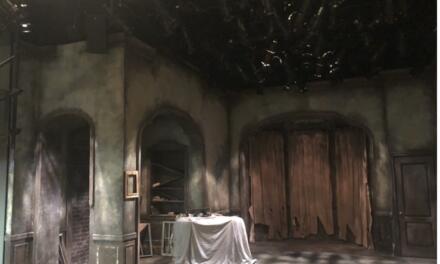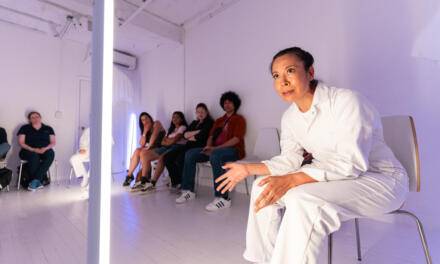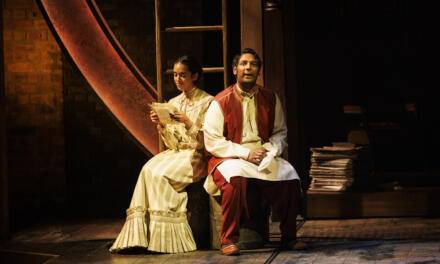It is 1930s Kyeongseong (what Seoul was called during the Japanese occupation), and the colonial Japanese government is enforcing a Japanese-only policy to bolster the forced assimilation of colonized Koreans. Anything that can arouse Korean nationalist sentiment raises suspicion among the Japanese authorities. A Korean theatre show that gathers a mass audience? That’s a hard no. After all, the theatre is an incendiary place where even the slightest spark can ignite a wildfire of mass protest. In a desperate attempt to avoid censorship, a group of students decides to stage an Italian opera. The musical Il Tenore (The Tenor), which premiered at the Towol Theater at the Seoul Arts Center last December, explores theatre’s subversive, transformative, and lasting power through a daring group of students’ journey to stage Korea’s first opera under colonial rule. Following a successful premiere, the musical returns to Blue Square for an extended run from March 29th to May 19th.
Il Tenore takes inspiration from the real-life story of Lee In-sun (1907–1960), an early pioneer of Korean opera. Lee, a doctor by training, studied voice in Milan to become Korea’s first tenor and opera director in colonized Joseon. In the musical, the protagonist is reimagined (and hence renamed) as Yi-sun, a meek medical student who sets out to metaphorically and literally find his voice in a hostile and oppressive world that forcibly silences people. Aside from a few biographical elements about the real-life tenor, almost everything in the story is fictionalized, including its depiction of the first Korean opera production. (In reality, the first Korean opera production that Lee was involved in, La Traviata, took place in 1948—after Korea was liberated from Japan.) In loosely referencing the activities of early theatre organizations, including the Theatre Research Group, and historical incidents such as the Bumingwan bombing, the musical skillfully weaves snippets of theatrical culture in the rapidly modernizing colonial capital into a story about art and politics, love and allegiance, personal and national liberation.
The new musical is presented by OD company, which, since its founding in 2001, has been a major driving force in South Korea’s growing musical theatre industry, successfully introducing licensed productions of Broadway musicals such as Jekyll and Hyde, Sweeney Todd, and Man of La Mancha to local audiences. This year, OD is looking to expand its scope into original musicals domestically and internationally. Il Tenore is the first among its ambitious new projects geared towards Korean audiences, while its adaptation of The Great Gatsby is set to open on Broadway next month. Il Tenore was produced after seven years of development, with its lead creative team hailing from Seoul and New York. The creative forces behind this project include Hue Park and Will Aronson, the duo who cowrote Maybe Happy Ending (2016, its English version premiered at Atlanta’s Alliance Theatre in 2020). Director Kim Dong Yeon and stage designer Oh Pil-Young, the masterminds behind the massive success of Death Note in 2022, reunited for this production. Choreographer Connor Gallagher, who worked on Beetlejuice on Broadway, is also on the creative team.
Set in 1930s Kyeongseong, the musical zooms in on Yi-sun, a young man who joins a clandestine anti-Japanese student activist organization that masquerades as an innocuous drama society. The organization’s group dynamic is fraught with tension as two friend-rivals, the director Jin-Yeon and the ambitious set designer Soo-han, hold opposing views on anticolonial political activism and the social role of art. Jin-Yeon advocates for moderate measures, using art to enlighten and arouse people. By contrast, Soo-han argues for a hardline, militant approach that embraces direct confrontation. Yi-sun wavers between his more vocal friends, but his destiny changes when he stumbles into a singing class. His singing venture is initially scorned as a luxurious pastime, but the drama society quickly finds a way to capitalize on Yi-sun’s stunning voice, using “Western Changgeuk (a form of Korean theatre performed by multiple pansori singers)” to fool Japanese censors. The story follows Yi-sun and his friends’ bumpy road to staging Korea’s first opera production as they try to juggle the challenges of reaching new artistic heights while serving the noble goal of liberation.
The first act, a run-up to the opera’s audition, is packed with events that drive the narrative forward. However, the book seems to encounter the second-act problems many musicals face. Part of the issue is the framing device set in Yi-sun’s snug New York apartment, where the now supposedly world-famous tenor reminisces on his humble and unexpected beginnings. This frame initially puts an ambitious and imaginative spin on the story, but the second act loses vitality and momentum when it gives in to historizing “the first night.” The first act’s “let’s-put-on-a-show” thrill is replaced with an outpouring of emotions and retrospective summaries.
Along the process, the first act’s debate on whether art is a valid form of resistance and its significance and worth in turbulent times is lost. As the stakes for the opera grow, the milestone of staging the first Korean opera production overpowers the students’ original purpose to inspire and speak to the citizens of Kyeongseong through art. Ironically, the pressure to excel and impress the higher-ups, as well as the assassination plot that culminates in the bombing of the theatre undermine the production’s humble yet ambitious belief in connecting with and transforming their fellow citizens. Curiously, the musical downplays the fictional opera’s narrative parallels (entitled I Sognatori, or The Dreamers) to Joseon’s political predicament in performance, although its depiction of a Venetian uprising against foreign invasion was the main draw for the students. The only parts we see of the opera-within-the-musical are the romantic arias about “dreams”—stirring but politically ambiguous—, leaving one to wonder how I Sognatori might have spoken to its imagined audience of colonized Koreans. But I would argue that their ambiguity provides a special thrill for the musical’s audience since the musical makes ample use of repetition and reprise for these wonderful numbers—as it should— and allows us to experience music’s power as it is.

Yi-sun (Seo Kyung-soo) and company, “I Sognatori Audition” from Musical Il Tenore (2023) at Towol Theatre at Seoul Arts Center. Photo courtesy of OD Company
Needless to say, music is Il Tenore’s forte. As I mentioned, Will Aronson has written memorable themes for the opera within the musical, repeated in different variations. But not to be missed are the musical’s nondiegetic numbers, particularly “Louder” and “This Little Perfect World.” The first is the title character’s musical exclamation of finding his voice. Performer Hong Kwang-ho’s transformation from a goofy, shy young man to a strong vocalist is dazzling and rapturous, conveying music’s liberating and empowering potential in a world that forcefully silences people. “This Little Perfect World” is a sweet and endearing ensemble number sung to the student organization’s haven, the theatre. It will melt the hearts of anyone who has ever been bitten by the theatre bug. Such numbers are enhanced by an 18-piece orchestra, with a strong emphasis on the string section, which provides rich and soaring melodies.
Another feat of the musical is its portrayal of non-Korean residents in modern Kyeongseong. It attempts to veer away from the stereotypical, one-dimensional depiction of Japanese characters as villains to a more nuanced and broader interpretation, represented by a young violinist sympathetic to the student–activists’ cause and a sadistic torturer who approximates the doctor from Ariel Dorfman’s Death and the Maiden. In addition, Caucasian actresses are cast in the role of Mrs. Becker, the American missionary who mentors Yi-sun and the fledgling opera’s orchestra. I found both the unprecedented casting choice and their performances pleasantly surprising. On the night I saw the show, Adriana Tomeu (who alternates the role with Brooke Prince, both hailing from the United States) naturally switched between Korean and English, carrying substantial dramatic weight as one of the key figures in the operatic venture and adding authenticity to the dramatic narrative and performance.

Yi-sun (Hong Kwang-ho) and Mrs. Becker (Adriana Tomeu), performing “Opera Lesson” from Musical Il Tenore (2023) at Towol Theatre at Seoul Arts Center. Photo courtesy of OD Company
Refreshing and even adventurous, Il Tenore is a welcome addition to a growing roster of original Korean musicals that resemble an anthology of nineteenth-century Western novels and biographies of nineteenth- and twentieth-century Western artists. Apart from the clunky parts in the second act, Il Tenore hits all the difficult notes a musical can reach: an inspiring message, fleshed-out characters, and beautiful music. To top it all, this impressive new work successfully conveys the power of music and theatre through live performance.
This post was written by the author in their personal capacity.The opinions expressed in this article are the author’s own and do not reflect the view of The Theatre Times, their staff or collaborators.
This post was written by Hansol Oh.
The views expressed here belong to the author and do not necessarily reflect our views and opinions.


















